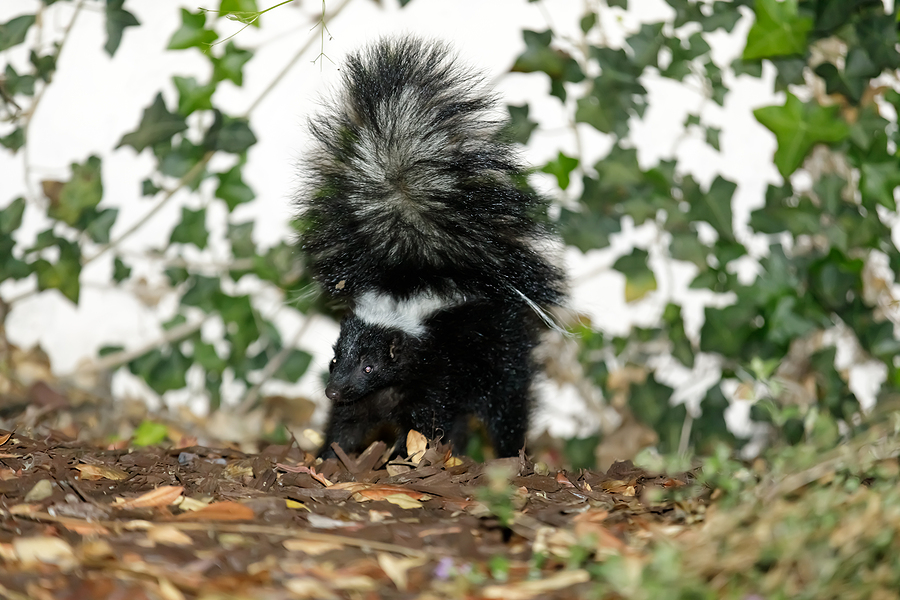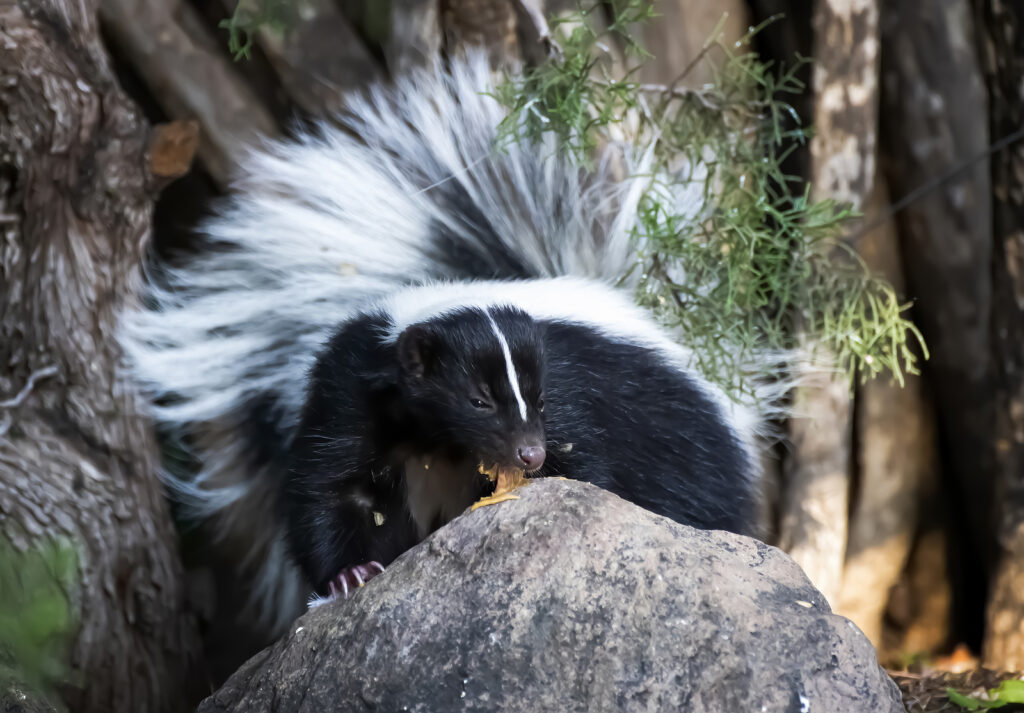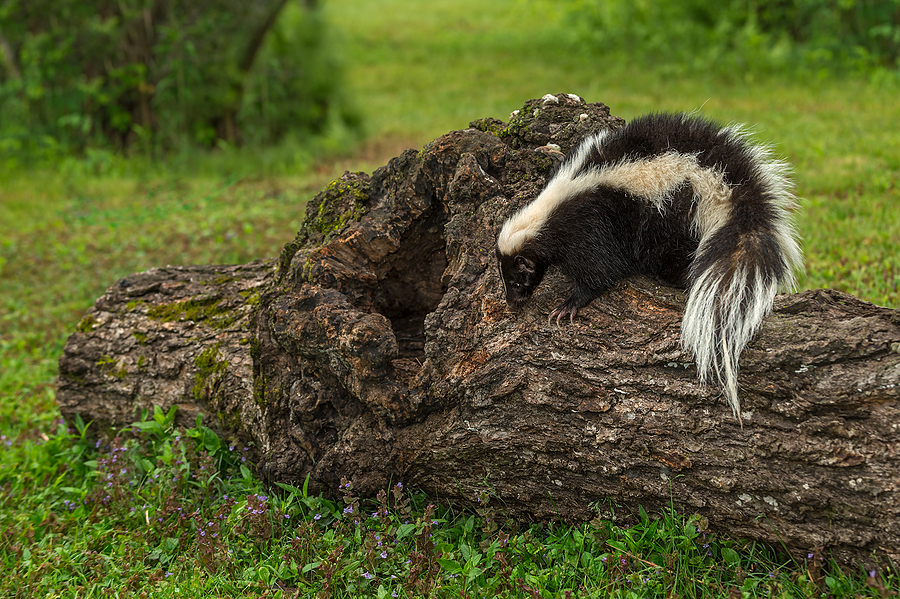Have you noticed signs of nocturnal visitors digging through your yard or hiding under your deck? Chances are, you may be dealing with skunks. While these striped critters are critical players in maintaining ecological balance, their presence on your property can pose challenges, from unpleasant odors to potential property damage. However, controlling skunks doesn’t have to be harmful or cruel.
This blog post will guide you through effective and humane skunk control methods to keep your property safe while ensuring the well-being of these fascinating creatures. You’ll gain insights into skunk behavior, learn safe deterrent methods, and understand when to call for professional help. Coexistence is possible—with the right approach.

Understanding Skunk Behavior
Understanding skunk behavior is the first step toward effective control. By knowing their habits, you can devise proactive strategies to prevent issues.
- Nocturnal Activity: Skunks are most active at night, which is why their presence may go unnoticed until you wake up to signs of their visit.
- Denning Habits: They seek shelter in convenient places, such as under porches, decks, sheds, or tree stumps, particularly during colder months or breeding season.
- Diet: Skunks are omnivores, feeding on a mix of insects, rodents, bird eggs, and vegetation. If you leave pet food or garbage outside, it becomes an open invitation for them.
- Spraying: Their infamous scent comes from spraying a strong, oily liquid as a defense mechanism when they feel threatened. Always maintain a safe distance from skunks to avoid being sprayed.
- Mating Season: Skunks are more active and visible during their mating season (late winter to early spring), which could lead to increased encounters with humans.
Having this knowledge helps homeowners anticipate skunk behavior and craft effective, humane strategies for control.
Safe Exclusion Methods for Skunk Control
An effective way to keep skunks off your property is by making it less accessible. Exclusion techniques are humane, long-lasting, and environmentally friendly.
1. Install Fencing
Skunks are excellent diggers, but they are not great climbers. A well-installed fence with the following features can keep them at bay:
- Ensure the fence extends 1–2 feet underground to prevent digging.
- Use sturdy materials such as wire mesh or hardware cloth.
- Angle the bottom of the fence outward to add extra protection and discourage burrowing.
2. Use One-Way Doors
If skunks have already taken up residence on your property, install one-way doors at their den entrances. These allow skunks to leave but prevent them from reentering. Combine this with methods to close off access points after the skunks depart.
Natural Skunk Repellents You Can Use
Skunks have sensitive noses, and you can use this to your advantage by employing natural animal deterrents. These methods are safe, cost-effective, and humane.
Common DIY Repellents:
- Citrus Peels – Orange, lemon, and grapefruit peels emit strong scents that skunks dislike.
- Cayenne Pepper – Sprinkle it around your yard or garden to irritate a skunk’s nasal passages without harming them.
- Garlic Cloves – Crush garlic and spread it around skunk entry points to deter them.
- Vinegar-Soaked Rags – Place vinegar-soaked rags in areas a skunk might frequent. Refresh every few days.
- Predator Urine – Products that mimic the scent of predators, such as coyote or dog urine, can send skunks scurrying. Brands like Shake-Away offer ready-to-use solutions.
⚠ Precaution: Always ensure any products you use are safe for pets, children, and other non-targeted wildlife.
Learn More About Nuisance Skunks
Professional Skunk Removal Services
If skunks are causing significant issues or DIY methods aren’t effective, it’s time to call in the experts. Professionals specializing in wildlife removal services have the skills and tools to handle skunks efficiently and ethically. A professional service can:
- Safely capture and relocate skunks in areas where it is legally permitted.
- Seal off large or complex spaces where skunks could shelter.
- Provide advice on further prevention techniques customized to your property.
Legal Considerations and Ethical Responsibilities
Before attempting any skunk control measures, familiarize yourself with local wildlife regulations and ethical guidelines:
- Permits for Trapping – Depending on your location, trapping skunks might require a permit.
- Protected Species – While striped skunks are common, some skunk species might have special protections.
- Relocation Rules – Relocated skunks must often be released in areas that comply with legal restrictions. Improper relocation may upset ecosystems.
- Humane Treatment – Never harm or handle skunks in a way that could cause them undue stress or injury.
Always prioritize humane methods that align with legal standards in your area.
How to Get Skunk Smell Off Your Pet’s Fur
If your dog or cat gets sprayed by a skunk, quick action is key. First, keep your pet outside or in an easy-to-clean area to prevent the smell from spreading. Separate them from other pets to avoid further contamination.
Step 1: Assess the Damage
Check how much spray is on your pet. Light exposure may only need a bath with a skunk odor shampoo. If your pet was directly sprayed or rolled in the scent, the smell may be more intense. Also, examine their skin for irritation—skunk spray can cause discomfort or even chemical burns. See a vet if your pet shows signs of injury.
Step 2: Gather Supplies
- Rubber gloves
- Old towels or rags
- Skunk odor shampoo
- Warm water
- Baking soda
- 3% hydrogen peroxide
- Liquid dish soap
- Distilled white vinegar
Step 3: Clean the Fur
- Wear gloves.
- Wipe excess spray from fur.
- Mix 1 quart hydrogen peroxide, ¼ cup baking soda, and 1 tsp dish soap.
- Massage into fur (avoiding eyes, nose, mouth), let sit for 5 minutes, then rinse with warm water. Repeat if needed.
- Dry your pet thoroughly in a warm space.
Step 4: Observation
Monitor your pet closely during and after cleaning. Skunk spray can cause irritation, so always act with care. If the smell persists or your pet seems distressed, contact your veterinarian.
FAQs About Skunk Removal and Control
✏ What are the signs of a skunk on my property?
Look for overturned garbage cans, shallow holes in your yard, or a strong, musky odor.
✏ How do I get rid of skunk odor?
A mixture of hydrogen peroxide, baking soda, and dish soap can neutralize skunk spray on skin, clothes, or pets.
✏ Is it safe to remove a skunk myself?
No. Skunks may spray or bite if provoked. It’s best to consult a professional wildlife removal service.
✏ How do I prevent skunks from returning?
Secure trash cans, remove food sources, block entry points under decks or sheds, and use natural repellents.
✏ Will skunks damage my property?
While unlikely to cause significant structural damage, skunks may dig in your yard or garden while foraging for food.
Coexisting with Wildlife
Skunks are an important part of our ecosystem, controlling insect and rodent populations. By understanding their behavior and using humane control methods, you can address skunk problems effectively while maintaining respect for wildlife.
If you’re dealing with skunk issues and need professional advice or assistance, don’t hesitate to contact us. Here at Modern Wildlife Control, we specialize in ethical, humane skunk removal, helping you restore peace to your property while protecting the local ecosystem.
Related Post: Defending Your Den: A Guide to Skunk Removal and Control





